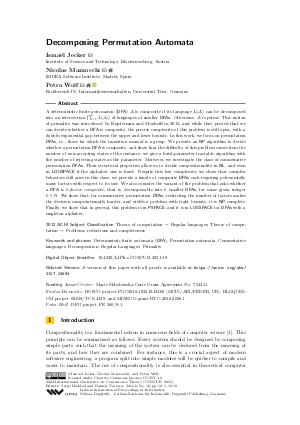Decomposing Permutation Automata
Authors
Ismaël Jecker,
Nicolas Mazzocchi,
Petra Wolf 
-
Part of:
Volume:
32nd International Conference on Concurrency Theory (CONCUR 2021)
Part of: Series: Leibniz International Proceedings in Informatics (LIPIcs)
Part of: Conference: International Conference on Concurrency Theory (CONCUR) - License:
 Creative Commons Attribution 4.0 International license
Creative Commons Attribution 4.0 International license
- Publication Date: 2021-08-13
File

PDF
LIPIcs.CONCUR.2021.18.pdf
- Filesize: 0.95 MB
- 19 pages
Document Identifiers
Related Versions
-
A version of this paper with all proofs is available at https://arxiv.org/abs/2107.04683
Subject Classification
ACM Subject Classification
- Theory of computation → Regular languages
- Theory of computation → Problems, reductions and completeness
Keywords
- Deterministic finite automata (DFA)
- Permutation automata
- Commutative languages
- Decomposition
- Regular Languages
- Primality
Metrics
- Access Statistics
-
Total Accesses (updated on a weekly basis)
0PDF Downloads0Metadata Views
Abstract
A deterministic finite automaton (DFA) 𝒜 is composite if its language L(𝒜) can be decomposed into an intersection ⋂_{i = 1}^k L(𝒜_i) of languages of smaller DFAs. Otherwise, 𝒜 is prime. This notion of primality was introduced by Kupferman and Mosheiff in 2013, and while they proved that we can decide whether a DFA is composite, the precise complexity of this problem is still open, with a doubly-exponential gap between the upper and lower bounds. In this work, we focus on permutation DFAs, i.e., those for which the transition monoid is a group. We provide an NP algorithm to decide whether a permutation DFA is composite, and show that the difficulty of this problem comes from the number of non-accepting states of the instance: we give a fixed-parameter tractable algorithm with the number of rejecting states as the parameter. Moreover, we investigate the class of commutative permutation DFAs. Their structural properties allow us to decide compositionality in NL, and even in LOGSPACE if the alphabet size is fixed. Despite this low complexity, we show that complex behaviors still arise in this class: we provide a family of composite DFAs each requiring polynomially many factors with respect to its size. We also consider the variant of the problem that asks whether a DFA is k-factor composite, that is, decomposable into k smaller DFAs, for some given integer k ∈ ℕ. We show that, for commutative permutation DFAs, restricting the number of factors makes the decision computationally harder, and yields a problem with tight bounds: it is NP-complete. Finally, we show that in general, this problem is in PSPACE, and it is in LOGSPACE for DFAs with a singleton alphabet.
Cite As Get BibTex
Ismaël Jecker, Nicolas Mazzocchi, and Petra Wolf. Decomposing Permutation Automata. In 32nd International Conference on Concurrency Theory (CONCUR 2021). Leibniz International Proceedings in Informatics (LIPIcs), Volume 203, pp. 18:1-18:19, Schloss Dagstuhl – Leibniz-Zentrum für Informatik (2021)
https://doi.org/10.4230/LIPIcs.CONCUR.2021.18
BibTex
@InProceedings{jecker_et_al:LIPIcs.CONCUR.2021.18,
author = {Jecker, Isma\"{e}l and Mazzocchi, Nicolas and Wolf, Petra},
title = {{Decomposing Permutation Automata}},
booktitle = {32nd International Conference on Concurrency Theory (CONCUR 2021)},
pages = {18:1--18:19},
series = {Leibniz International Proceedings in Informatics (LIPIcs)},
ISBN = {978-3-95977-203-7},
ISSN = {1868-8969},
year = {2021},
volume = {203},
editor = {Haddad, Serge and Varacca, Daniele},
publisher = {Schloss Dagstuhl -- Leibniz-Zentrum f{\"u}r Informatik},
address = {Dagstuhl, Germany},
URL = {https://drops.dagstuhl.de/entities/document/10.4230/LIPIcs.CONCUR.2021.18},
URN = {urn:nbn:de:0030-drops-143956},
doi = {10.4230/LIPIcs.CONCUR.2021.18},
annote = {Keywords: Deterministic finite automata (DFA), Permutation automata, Commutative languages, Decomposition, Regular Languages, Primality}
}
Author Details
Funding
- Jecker, Ismaël: Marie Skłodowska-Curie Grant Agreement No. 754411.
- Mazzocchi, Nicolas: BOSCO project PGC2018-102210-B-I00 (MCIU/AEI/FEDER, UE), BLOQUES-CM project S2018/TCS-4339, and MINECO grant RYC-2016-20281.
- Wolf, Petra: DFG project FE 560/9-1.
References
-
Christel Baier and Joost-Pieter Katoen. Principles of Model Checking. MIT Press, 2008.

- Edmund M. Clarke, David E. Long, and Kenneth L. McMillan. A language for compositional specification and verification of finite state hardware controllers. Proceedings of the IEEE, 79(9):1283-1292, 1991. URL: https://doi.org/10.1109/5.97298.
- Willem P. de Roever, Hans Langmaack, and Amir Pnueli, editors. Compositionality: The Significant Difference, International Symposium, COMPOS'97, Bad Malente, Germany, September 8-12, 1997. Revised Lectures, volume 1536 of Lecture Notes in Computer Science. Springer, 1998. URL: https://doi.org/10.1007/3-540-49213-5.
-
Michael R. Garey and David S. Johnson. Computers and Intractability: A Guide to the Theory of NP-Completeness. W. H. Freeman & Co., USA, 1979.

-
Stephen Gould, Ernest Peltzer, Robert Matthew Barrie, Michael Flanagan, and Darren Williams. Apparatus and method for large hardware finite state machine with embedded equivalence classes, 2007. US Patent 7,180,328.

- G. H. Hardy. An introduction to the theory of numbers. Bulletin of the American Mathematical Society, 35(6):778-818, November 1929. URL: https://projecteuclid.org:443/euclid.bams/1183493592.
- Ismaël Jecker, Orna Kupferman, and Nicolas Mazzocchi. Unary prime languages. In Javier Esparza and Daniel Král, editors, 45th International Symposium on Mathematical Foundations of Computer Science, MFCS 2020, August 24-28, 2020, Prague, Czech Republic, volume 170 of LIPIcs, pages 51:1-51:12. Schloss Dagstuhl - Leibniz-Zentrum für Informatik, 2020. URL: https://doi.org/10.4230/LIPIcs.MFCS.2020.51.
- Michal Kunc and Alexander Okhotin. Reversibility of computations in graph-walking automata. In Krishnendu Chatterjee and Jirí Sgall, editors, Mathematical Foundations of Computer Science 2013 - 38th International Symposium, MFCS 2013, Klosterneuburg, Austria, August 26-30, 2013. Proceedings, volume 8087 of Lecture Notes in Computer Science, pages 595-606. Springer, 2013. URL: https://doi.org/10.1007/978-3-642-40313-2_53.
- Orna Kupferman and Jonathan Mosheiff. Prime languages. Inf. Comput., 240:90-107, 2015. URL: https://doi.org/10.1016/j.ic.2014.09.010.
- Rolf Landauer. Irreversibility and heat generation in the computing process. IBM J. Res. Dev., 5(3):183-191, 1961. URL: https://doi.org/10.1147/rd.53.0183.
- Jaban Meher and M Ram Murty. Ramanujan’s proof of Bertrand’s postulate. The American Mathematical Monthly, 120(7):650-653, 2013. URL: https://doi.org/10.4169/amer.math.monthly.120.07.650.
-
Alon Netser. Decomposition of safe languages. Amirim Research Project report from the Hebrew University, 2018.

-
Volnei A. Pedroni. Finite State Machines in Hardware: Theory and Design (with VHDL and SystemVerilog). The MIT Press, 2013.

- Jean-Eric Pin. On reversible automata. In Imre Simon, editor, LATIN '92, 1st Latin American Symposium on Theoretical Informatics, São Paulo, Brazil, April 6-10, 1992, Proceedings, volume 583 of Lecture Notes in Computer Science, pages 401-416. Springer, 1992. URL: https://doi.org/10.1007/BFb0023844.
